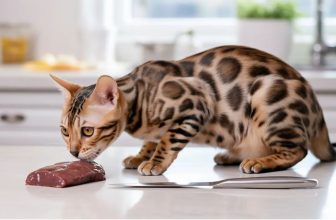Can Cats Eat Raw Meat? Safe, Natural, and Nutritious!
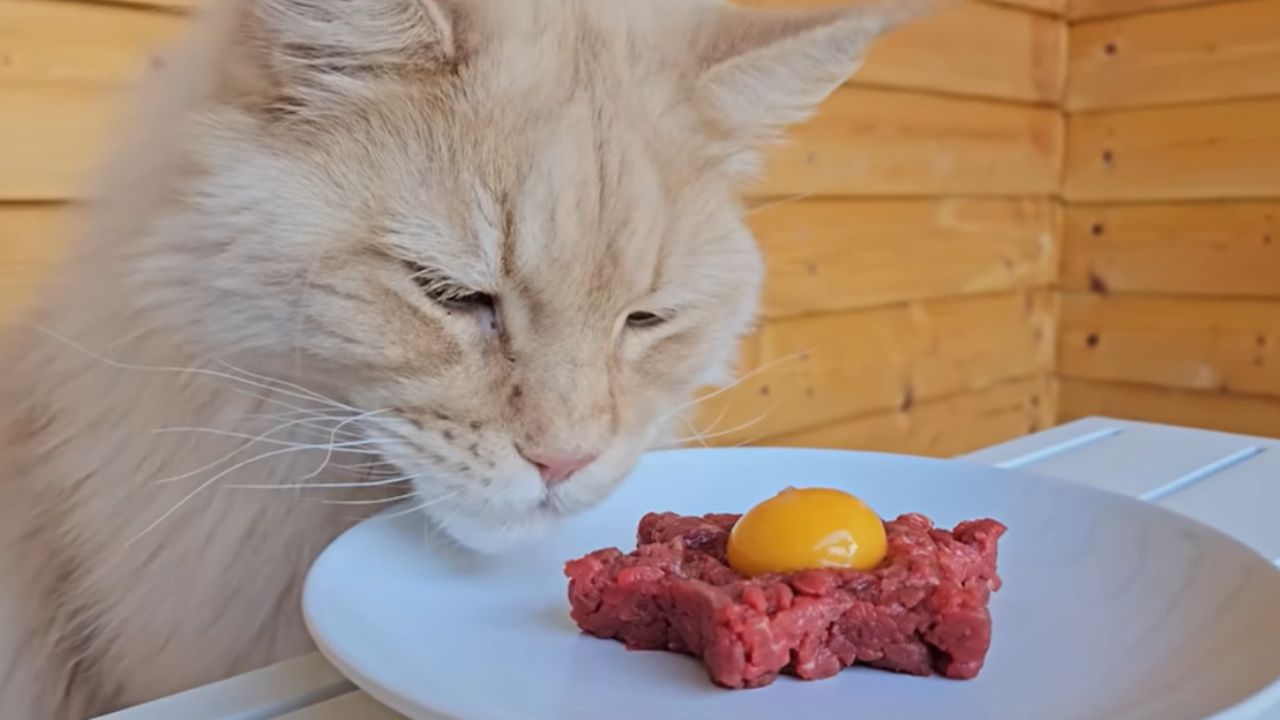
Can Cats Eat Raw Meat?
Yes, cats can eat raw meat since they are obligate carnivores. Raw meat mirrors their natural diet in the wild, offering essential nutrients like protein, taurine, and amino acids. However, feeding raw meat comes with risks like bacterial contamination or parasites. Always handle raw food with care and choose high-quality, fresh meat. It’s vital to ensure a balanced raw diet—just meat alone isn’t enough. For safety, consult a veterinarian before switching your cat to raw feeding. Done right, raw meat can support your cat’s energy, coat health, and digestion. Learn more to make the best choice for your feline friend.
Raw Meat Basics
Cats are natural carnivores and raw meat is an integral part of their diet in the wild. Many cat owners wonder if feeding raw meat is safe or beneficial for their pets. Understanding the basics of raw meat can help make informed decisions. Cats have specific dietary needs that raw meat can fulfill. It is important to ensure that the meat is fresh and free from harmful bacteria. The nutritional value and variety of raw meats can provide essential nutrients to support a cat’s health.
Nutritional Value
Raw meat is packed with essential nutrients that cats need. It includes protein, taurine, and vitamins. These nutrients support strong muscles and healthy organs. Let’s look at some key benefits:
- Protein: Crucial for muscle development and repair.
- Taurine: Vital for heart and eye health.
- Vitamins A, B, and E contribute to overall well-being.
Feeding raw meat can mimic a cat’s natural diet. It provides a more authentic source of nutrition than processed foods. Cats thrive on high-protein diets, and raw meat meets this requirement effectively.
Below is a simple table illustrating the typical nutritional content found in raw meat:
| Nutrient | Raw Meat |
|---|---|
| Protein | 20-30% |
| Taurine | 0.1-0.2% |
| Fat | 10-20% |
Types Of Raw Meat
There are several types of raw meat suitable for cats. Each type offers different benefits and flavors. Here are some common options:
- Chicken: Lean meat with high protein content.
- Beef: Rich in iron and B vitamins.
- Turkey: Low in fat, good for weight control.
- Fish: High in omega-3 fatty acids, supports skin health.
Choosing the right type of meat depends on the cat’s preferences and health needs. Chicken and turkey are often favored for their digestibility. Beef and fish provide additional nutrients like iron and omega-3. It is crucial to ensure the meat is sourced from reputable suppliers to avoid contamination.
Experimenting with different types can help find the best fit for your pet. Monitor their reactions and adjust the diet accordingly to maintain a healthy balance.
Benefits For Cats
Feeding cats raw meat can be a topic of interest. Many pet owners wonder if it’s safe and beneficial. Cats are obligate carnivores, meaning their diet relies heavily on meat. Raw meat can offer several benefits for cats. It aligns with their natural diet and provides essential nutrients. Understanding these benefits can help pet owners make informed decisions about their cat’s diet.
Natural Diet
Raw meat closely mimics a cat’s natural diet. Cats in the wild eat raw meat as their primary food source. This includes small animals like mice, birds, and insects. Domesticated cats still have instincts that align with these dietary habits. Feeding raw meat can support their instincts and behavior.
There are several benefits to a natural diet:
- Improved digestion: Cats have digestive systems designed for raw meat. Cooking can alter meat’s structure, making it harder to digest.
- Enhanced dental health: Chewing raw meat helps keep teeth clean and strong.
- Natural hydration: Raw meat has higher moisture content, aiding hydration.
It’s important to ensure the meat is fresh and clean. Avoid adding spices or seasonings. These can harm your cat. By mimicking their natural diet, cats can thrive and maintain optimal health.
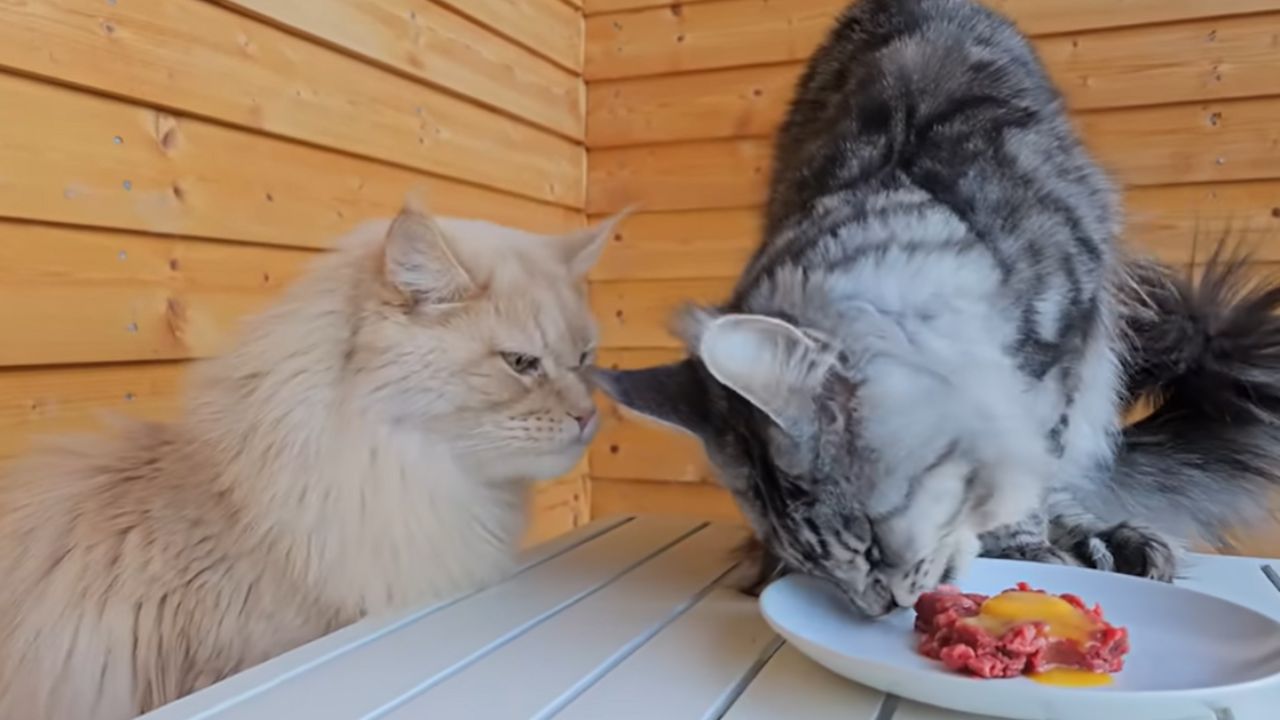
Protein Source
Protein is crucial for a cat’s health. Raw meat is a rich protein source. It provides amino acids vital for muscle development and energy. Cats need protein more than any other nutrient. Raw meat offers the purest form.
Benefits of protein in raw meat include:
- Muscle growth: Supports strong and lean muscle development.
- Energy boost: Provides sustained energy for playful activities.
- Skin and coat health: Promotes shiny fur and healthy skin.
Ensure the meat is fresh and free from contaminants. Consult a vet before changing your cat’s diet. They can advise on safe feeding practices. Proper protein intake helps cats lead healthy, active lives.
Risks Involved
Cats are natural hunters and meat-eaters. Many pet owners wonder about feeding them raw meat. This is a growing trend among some cat enthusiasts. Yet, it’s important to understand the risks involved. Raw meat can be dangerous for cats. It can lead to health issues if not handled properly. This article looks at the potential dangers of feeding cats raw meat.
Bacterial Contamination
Raw meat often contains bacteria. These bacteria can harm your cat. Salmonella and E. coli are common in raw meat. They can cause serious health problems. Cats with weak immune systems are at greater risk. Bacterial infections can lead to:
- Vomiting and diarrhea
- Lethargy and weakness
- Fever and stomach pain
Handling raw meat also requires care. Humans can get sick, too. Always wash your hands after handling. Clean surfaces and utensils thoroughly. The following table shows common bacteria found in raw meat and their effects:
| Bacteria | Effect on Cats |
|---|---|
| Salmonella | Gastrointestinal issues |
| E. coli | Severe stomach pain |
Parasites
Raw meat can be a source of parasites. These parasites can infect your cat. Toxoplasma gondii is a common parasite in raw meat. It can cause toxoplasmosis in cats. Symptoms include:
- Loss of appetite
- Fever and lethargy
- Eye problems
Some parasites can be passed to humans. Pregnant women are at particular risk. Cooking meat kills most parasites. But feeding raw meat can expose your cat to danger. Regular vet check-ups are important. They help in detecting parasites early. Always consult your vet before changing your cat’s diet.
Recommended Meats
Cats are natural carnivores. Their diet mainly consists of meat. Feeding your feline raw meat can mimic their diet in the wild. But not all meats are safe for cats. It’s essential to know which meats are recommended. This ensures your cat gets a balanced diet and stays healthy.
Safe Options
Providing safe meat options for your cat is crucial. Not all meats are suitable for them. Here are some safe choices you can offer:
- Chicken: A popular choice among cat owners. Rich in protein and easy to digest.
- Turkey: Similar to chicken, turkey is nutritious and safe.
- Beef: Offers essential nutrients and protein. Make sure it’s fresh and clean.
- Lamb: High-quality source of protein. Ensure it’s free from additives.
It’s important to serve these meats fresh and raw. Cooked meat can lose valuable nutrients. Ensure the meat is free from bones, as they can be harmful. Regularly check the meat for any signs of spoilage. Freshness is key for your cat’s health.
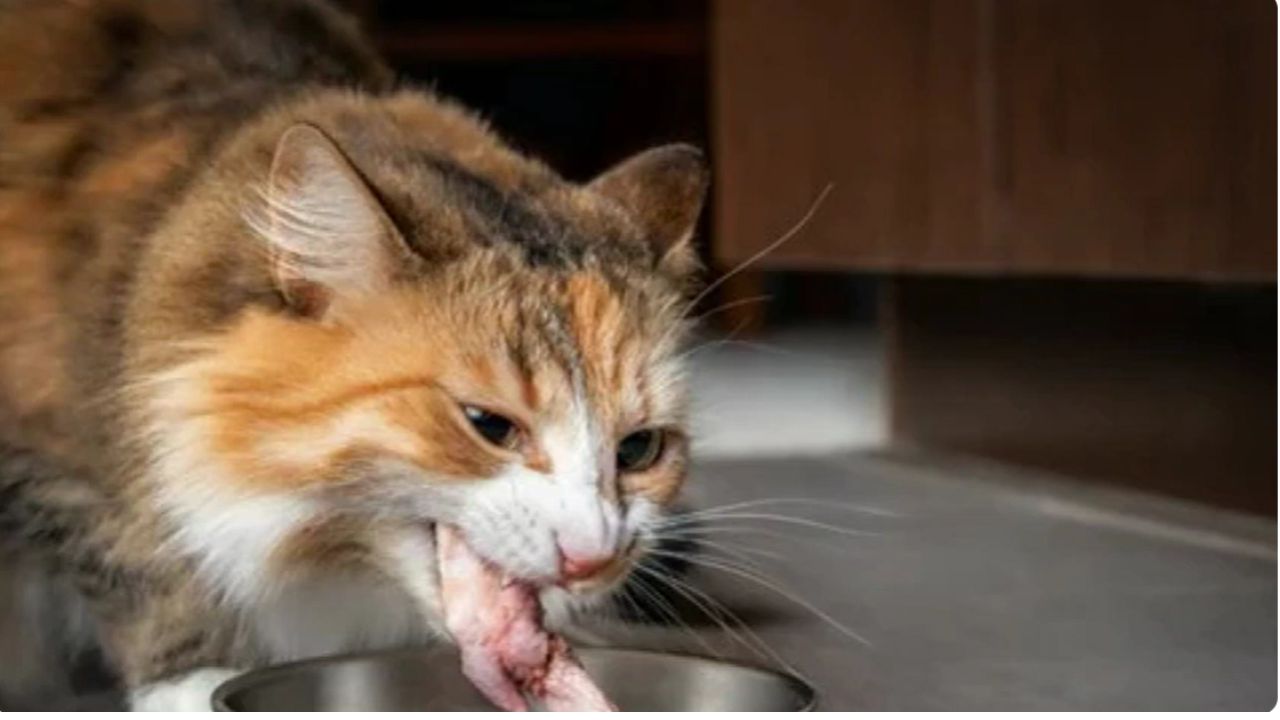
Avoiding Dangerous Cuts
Some meat cuts can be dangerous for your cat. Avoiding them is essential for your pet’s safety. Here are some cuts to be cautious about:
| Meat Cut | Reason to Avoid |
|---|---|
| Pork | It can cause digestive issues. Often carries parasites. |
| Fish | Contains thiaminase, which destroys vitamin B1. |
| Processed Meats | High in salt and additives. Not suitable for cats. |
Always ensure the meat is free from seasonings. Salt, garlic, and onions can be toxic to cats. Avoid giving your cat leftovers from your meals. They may contain harmful ingredients. Prioritize fresh, unprocessed meat for the best nutrition.
Preparation Tips
Cats are natural carnivores, and their diet often includes raw meat. Feeding raw meat to cats can be beneficial. It provides essential nutrients that support their health. However, proper preparation is crucial to ensure safety. This involves understanding how to handle and serve raw meat correctly. By following preparation tips, you can offer your feline friend a healthy meal. Let’s explore some key practices to keep in mind.
Hygiene Practices
Maintaining hygiene when feeding raw meat is vital. It prevents contamination and keeps your pet safe. Here are some important steps:
- Wash your hands before and after handling meat.
- Use clean utensils and cutting boards.
- Disinfect surfaces where meat is prepared.
- Store meat in sealed containers in the fridge.
- Check the meat for freshness before serving.
Following these practices reduces the risk of bacteria and ensures clean feeding. Proper cleaning minimizes germs and keeps your cat healthy. Remember, cats have sensitive stomachs. Any contamination can lead to health issues.
Proper Portioning
Serving the right portion size is crucial. It ensures your cat gets enough nutrients without overeating. Consider the following tips:
- Know your cat’s weight and age to determine portion size.
- Start with small amounts to observe your cat’s reaction.
- Gradually increase the portion if tolerated well.
- Use a kitchen scale for accurate measurements.
Here’s a simple guide:
| Cat Weight | Daily Portion |
|---|---|
| 3-5 lbs | 1-2 oz |
| 6-10 lbs | 2-3 oz |
| 11-15 lbs | 3-4 oz |
Serving the correct amount prevents overfeeding and keeps your cat fit. Monitor your cat’s weight to adjust portions as needed. Proper portioning aids digestion and promotes wellness.
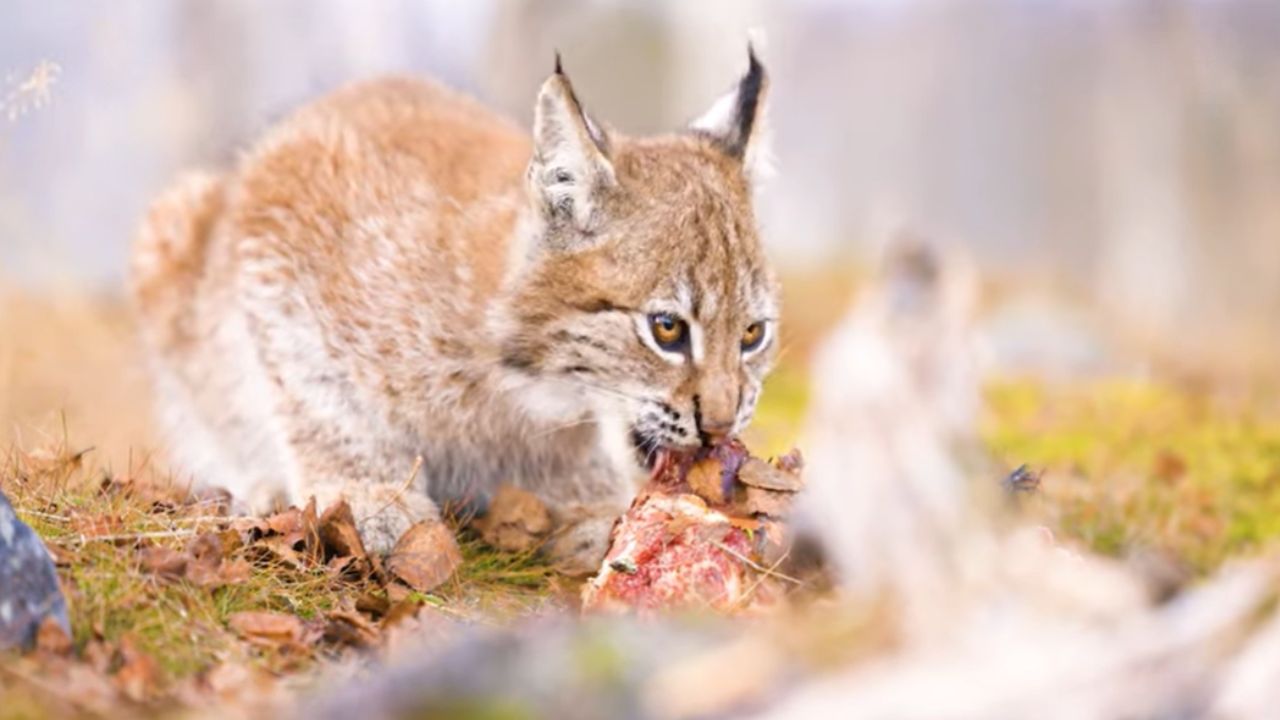
Signs Of Health Issues
Cats are natural carnivores. Their diet mainly consists of meat. Many cat owners wonder if feeding cats raw meat is safe. While some say it’s natural, others worry about health risks. Raw meat may contain harmful bacteria. This can cause health issues in cats. Owners should watch for signs of health problems. Understanding these signs is essential. Early detection can prevent serious conditions.
Digestive Problems
Feeding raw meat to cats can lead to digestive problems. Cats have sensitive stomachs. They might not handle raw meat well. Common symptoms of digestive issues include:
- Vomiting
- Diarrhea
- Lack of appetite
- Abdominal pain
Some cats might experience mild symptoms. Others could have severe reactions. Bacterial contamination is a major concern. Raw meat may contain Salmonella or E. coli. These bacteria can cause serious illness. It’s crucial to monitor your cat’s health. If symptoms persist, consult a vet.
Proper hygiene is vital when handling raw meat. Clean surfaces and utensils thoroughly. This reduces the risk of bacterial spread. Ensuring your cat’s digestive health is important. Always consider their well-being before dietary changes.
Allergic Reactions
Allergic reactions are another concern with raw meat diets. Cats can develop allergies to certain proteins. Symptoms of an allergic reaction may include:
- Itchy skin
- Swelling
- Difficulty breathing
- Red, inflamed skin
Allergies can appear suddenly. Even if a cat has eaten the meat before. Identifying the allergen is crucial. It helps prevent future reactions. Consulting a vet can provide insights. They might suggest allergy tests. This aids in pinpointing the exact cause. Avoid feeding the suspected meat if symptoms show.
Monitoring your cat’s health is key. Keep track of any unusual behavior. This helps in early detection of allergies. Safety should be the priority. Always prioritize your cat’s health over dietary preferences.
Consulting A Vet
Cats are known for their carnivorous diet. Many pet owners wonder if raw meat is a suitable option for their feline friends. While cats can digest raw meat, there are several factors to consider before making it part of their diet. Consulting a vet becomes crucial to ensure your cat’s health and safety. A vet can provide insights into nutritional needs and potential risks associated with raw meat. Understanding these aspects can help you make an informed decision about feeding raw meat to your cat.
Importance Of Professional Advice
Professional advice is essential when considering raw meat for your cat. A vet can offer guidance on nutritional requirements and help assess whether raw meat is suitable. Cats have specific dietary needs that must be met to maintain health and energy levels. A vet can evaluate your cat’s health status and determine if raw meat is appropriate. They can also advise on portion sizes and frequency.
Here are a few reasons why consulting a vet is crucial:
- Nutritional Balance: Ensures your cat receives all necessary nutrients.
- Health Assessment: Identifies any underlying health issues.
- Risk Evaluation: Discusses potential risks of bacteria and parasites in raw meat.
- Personalized Advice: Offers tailored advice based on your cat’s age and health.
A vet can also provide resources on safe handling and storage of raw meat. Safety is important to prevent contamination and ensure the well-being of your pet. Regular check-ups with your vet can help monitor your cat’s health on a raw meat diet.
Tailoring Diet Plans
Each cat is unique. Diet plans should be tailored to meet individual needs. A vet can help design a diet plan that incorporates raw meat without compromising health. They consider various factors like your cat’s age, weight, and activity level. Raw meat should be balanced with other food items to ensure complete nutrition.
Here’s what a tailored diet plan might include:
| Component | Details |
|---|---|
| Protein Sources | Lean meats like chicken or turkey |
| Supplements | Vitamins and minerals are essential for cats |
| Fiber | Small amounts of cooked vegetables |
| Hydration | Access to fresh water at all times |
Consistency in feeding is key. Stick to the vet’s recommendations and monitor your cat’s health regularly. Adjustments to the diet plan may be necessary based on your cat’s response. Regular vet visits can help track progress and make necessary changes.
Alternatives To Raw Meat
Cats are natural carnivores. They love meat. Many cat owners wonder if their furry friends can eat raw meat. Raw meat might seem like a natural choice for cats. But it can have risks. Bacteria and parasites are the main concerns. Some experts say raw meat is okay if it’s fresh and handled well. But not everyone agrees. So, what’s the best choice for your cat? Let’s look at some alternatives to raw meat.
Commercial Raw Diets
Many companies offer commercial raw diets for cats. These diets are made to be safe. They are tested for bacteria and parasites. Commercial raw diets are balanced with vitamins and minerals. This ensures your cat gets the nutrients it needs. Here are some benefits of commercial raw diets:
- Convenience: Easy to store and serve.
- Safety: Tested for harmful substances.
- Balanced nutrition: Includes all necessary vitamins.
But there are some downsides too:
- Cost: Can be expensive.
- Availability: Not always available in local stores.
Choosing a commercial raw diet means trusting the company to ensure safety. It’s important to check reviews and research the brand. Look for brands that follow strict safety guidelines. Your cat’s health depends on it.
Cooked Meat Options
Cooking meat can be a safer option for your cat. Cooking kills bacteria and parasites. It makes the meat safe to eat. Here are some cooked meat options for cats:
- Chicken: Boiled or baked without spices.
- Turkey: Plain cooked turkey is great.
- Fish: Steamed fish can be delicious.
Cooking meat changes the taste. Cats might like it better. But it’s important to avoid spices and oil. These can upset a cat’s stomach. Cooked meat should be part of a balanced diet. It shouldn’t be the only food your cat eats. You can mix it with cat food for a balanced meal. Moderation is key. Too much cooked meat can lead to health issues. Always consult with a vet for advice.
Frequently Asked Questions: Can Cats Eat Raw Meat?
What Kind Of Raw Meat Can Cats Eat?
Cats can eat raw chicken, turkey, beef, and lamb. Ensure the meat is fresh and free from bones. Avoid feeding raw pork and fish due to potential parasites and harmful bacteria. Always consult a vet before introducing raw meat into your cat’s diet to ensure safety and nutritional balance.
What Happens If A Cat Eats Raw Meat?
Cats can safely eat raw meat if it’s fresh and unseasoned. Their digestive system is designed for it. However, ensure the meat is free from pathogens to prevent illness. Introduce raw meat gradually into their diet to avoid digestive upset. Consult a vet for a balanced raw feeding plan.
Is It Better To Feed Cats Raw Or Cooked Meat?
Feeding cats raw meat can offer nutritional benefits but carries risks of bacteria and parasites. Cooked meat reduces these risks but may lose some nutrients. Consult your vet to decide the best option for your cat’s health. Always ensure a balanced diet and avoid seasoning.
Are Cats Allowed To Eat Raw Chicken?
Cats can eat raw chicken, but ensure it’s fresh and handled safely. Raw diets may pose risks like bacteria. Consult a vet before making dietary changes to ensure it’s suitable for your cat. Proper preparation and hygiene are crucial to prevent health issues.
Is Raw Meat Safe For Cats?
Yes, raw meat is safe for most cats. It mimics their natural diet. Ensure it’s fresh and clean.
Conclusion
Cats can eat raw meat, but be cautious. Ensure the meat is fresh. Consult your vet for safety tips. Raw diets can have risks. Balance is key in their meals. Monitor your cat’s health and digestion. Changes in diet need careful observation.
Use high-quality meat sources. Hygiene is critical when handling raw food. Keep your feline friend healthy and happy. Educate yourself on raw feeding practices. Protect your pet with informed choices. A well-fed cat is a contented cat. Always prioritize their well-being and safety.



